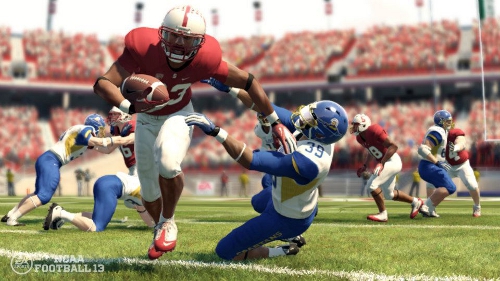Class Action Settlement Terms Will Have Little Effect on Sports Gaming Landscape

Last Friday the proposed settlement in the case that claimed with EA Sports holding the exclusives for the major football licenses they had “raised” prices was announced. The big news wasn’t in the money that the company must pay out which is relatively insignificant but that they are restricted from holding the exclusive with NCAA for a period of five years. Of course those dissatisfied with EA’s efforts were quick to exclaim joy and hope of near future where competition would be present in the marketplace. Unfortunately that is simply not a realistic scenario particularly when it comes to college products.
EA Sports relented in this case by agreeing to terms that they knew would damage them very little. $27 million sounds like significant damage but put into perspective it really isn’t. That is about half of what the company made just on Madden NFL 12’s Ultimate Team Mode. It’s also less money than the NFL credited EA heading into last season due to the threat of a lockout in exchange for extending the license another year.
Being unable to hold an exclusive with Arena Football is a complete non-factor and there is probably no need to hold an exclusive for college football. No other publishers are going to dig themselves into the hole that is a new NCAA Football product. The high costs involved, intense resources necessary, uncertain investment return with low potential for growth, and legal troubles they would be entering themselves into makes for a completely unappealing venture.
Take Two (parent company of 2K Sports) wants nothing to do with licensed properties. They’ve shut down all of their yearly sports titles with the exception of NBA 2K because they can’t justify getting rid of such a profitable property and it’s a shining star in their lineup. Should that series ever start to slip though fans should be concerned that Take Two would consider selling it off or closing it down. They would prefer to have a portfolio of solely their own IP. They are definitely not interested in expanding into properties that would require a license on top of all the inherent development costs.
Even if 2K or anyone else were interested in doing a college game – despite all indications being otherwise – they’d be facing the market leader and would be fighting for a percentage of sales. With the development costs as high as they are, and getting off the ground costing far more than what EA has to maintain from year to year, there is no room to succeed there.
No one makes college basketball games anymore for similar reasons. The potential for sales don’t justify there being a product the costs of which would be necessary to meet consumer expectations which have gotten fairly high.
The player likeness lawsuits making their way through the courts are a big factor here as well. No company not involved in that wants to get mixed up in the litigation by releasing a game right now. The consolidated trial against the NCAA, CLC, and EA is set to begin March 2013. Once that is resolved assuming it ends in a favorable decision there may be an opening for college sports to become more appealing to publishers.
Another concern to consider – and this is probably why the NCAA Football series has seen less advancement than others in recent years and EA is not all that enthusiastic about its future – is the potential for digital revenue is lacking. The opportunity to leverage personalities is absent due to amateur restrictions. No Ultimate Team mode being possible is a huge deal. That mode made over $100 million in FIFA 12 and around $50 million in Madden 12. Instead NCAA Football has more DLC features and “cheats” but none bring in revenue anywhere near what those have.
Digital revenue has become increasingly important and will continue to be going forward. It’s how EA has offset either losses in retail sales or supplemented stagnant sales numbers. NCAA lacking that revenue stream puts its future in danger.
It’s more likely in the current market that there would be no college football game than two or more competing products. EA Sports knew this when they agreed to the class action settlement. The legality of exclusive licenses was never the target of the suit and never in question – instead it sought to open up football more by restricting the company from holding exclusives with all the major football leagues. EA Sports will likely be seeking more favorable terms with the NFL when it comes to extending their exclusive with the league given that they’re clearly the lesser satisfied party in that deal and there is no one in a position to challenge them for it. Ultimately all this lawsuit probably did was make it cheaper for EA to pay for the NCAA license.
